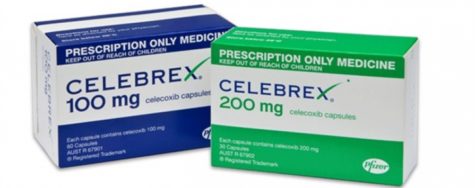 HYANNIS – Investigators at Cleveland Clinic recently concluded that after studying the safety of the pain reliever celecoxib (Celebrex) for more than 10 years, it poses no more risk to heart health than ibuprofen (Advil or Motrin) or naproxen (Aleve). It also causes fewer stomach and kidney issues than ibuprofen, one of the most popular pain relievers available without a prescription.
HYANNIS – Investigators at Cleveland Clinic recently concluded that after studying the safety of the pain reliever celecoxib (Celebrex) for more than 10 years, it poses no more risk to heart health than ibuprofen (Advil or Motrin) or naproxen (Aleve). It also causes fewer stomach and kidney issues than ibuprofen, one of the most popular pain relievers available without a prescription.
This was a surprise to the study’s authors who maintained a long-held belief that naproxen was the safest.
“The study was very well done, sponsored by the Cleveland Clinic, which is an indicator of excellence,” said orthopedic surgeon Jesse Affonso MD. “Whenever you see a study coming out of the Cleveland Clinic, you take notice.”
Celecoxib is a prescription drug used primarily to treat the pain and inflammation from arthritis. It received FDA approval in 1998. Concerns began to emerge soon after, when there was a surge in the incidence of both fatal and non-fatal heart attacks among the users of a similar drug, Vioxx.
“Celebrex has always been under the cloud of Vioxx. They both belong to a group of drugs called COX-2 inhibitors. I have been hesitant to prescribe it, never using it for more than a short course of pain relief,” said Dr. Affonso. “This study will change the way I prescribe it.”
While Vioxx was removed from the market in 2004, Celebrex was allowed to stay in use, with a contingency. The FDA mandated that maker Pfizer commission a long-term safety study.
The Prospective Randomized Evaluation of Celecoxib Integrated Safety versus Ibuprofen and Naproxen (PRESICION) trial concluded a decade-long evaluation in 2014. The goal was to see if Celebrex was at least as safe as the other two drugs.
The PRECISION trial included 24,081 patients in 926 centers across 13 countries. Participants all had arthritis and were either at high risk for, or diagnosed with, cardiovascular disease.
The results were published in The New England Journal of Medicine on November 14, 2016.
Investigators found that celecoxib outperformed naproxen and ibuprofen on several measures, including:
- It had the lowest rate of cardiovascular events (188), either fatal or non-fatal, as compared to naproxen (201) and ibuprofen (218).
- More people taking ibuprofen (92) experienced serious kidney disease than either naproxen (71) or celecoxib (57), which was the safest.
- There were 25 percent more deaths from all causes among the naproxen group (163) than those taking celecoxib (132), which was the lowest.
- The fewest incidents of gastric bleeding or ulcers occurred among users of celecoxib (86), followed by naproxen (119) and ibuprofen (130).
Is Taking Celecoxib Safe For Regular Use?
Cape Cod Healthcare cardiologist Mallory Hatfield MD still isn’t so sure.
“I have had patients calling and asking about this study,” said Dr. Hatfield. “And what I tell them is the answer isn’t that simple.”
Dr. Hatfield commends the makers of Celebrex for trying to evaluate the safety of all of these drugs, especially since ibuprofen and naproxen are taken without a doctor’s prescription.
“It’s a very good study. I tell my patients that it at least proves to us that what we know about NSAIDs (non-steroidal anti-inflammatory drugs) also applies to Celebrex, which is the lower the dose and the less frequently taken, the safer it is,” she said.
“The patients I see who take these medications aren’t taking them for the short- term. They are taking them for conditions like debilitating arthritis and they don’t take low-dose, short-course treatments.”
And that’s where there is a problem. This study evaluated low- to moderate-dose use of the drugs. Participants spent, on average, less that three years being treated by the study drugs and followed for only four more years. Dr. Hatfield sees patients who have been using these drugs regularly well beyond 10 years.
“Last week I saw a patient who was referred to me from the emergency room for congestive heart failure,” said Dr. Hatfield. “ The patient is young—only in his 40s. But, he was injured in an accident when he was younger and has been taking ibuprofen every day since. Now he will be my patient for the rest of his life.”
What’s more challenging is advising the patient without a diagnosis of cardiovascular disease, but who are at increased risk due to their age.
“I worry about the 73-year-old active woman who is jogging or exercising a lot, in pain, and taking these medications, often in higher doses. They need to be educated because by virtue of their age, they are at an increased risk for cardiovascular disease already,” said Dr. Hatfield.
She warns patients who already have cardiovascular disease and want to take any of the NSAIDs to be cautious.
“Be in tune with your body, pay attention to any increases in episodes of angina or when they happen at other times than have been the norm.”
Dr. Hatfield is less concerned about the occasional use of any of these medications for episodic pain relief, especially when taken in a low to moderate dose.
“Patients needing pain relief need to understand the importance of taking these drugs as infrequently as possible and as low a dose as one can. The pain reliever of choice, and the safest one, is still Tylenol.”
























